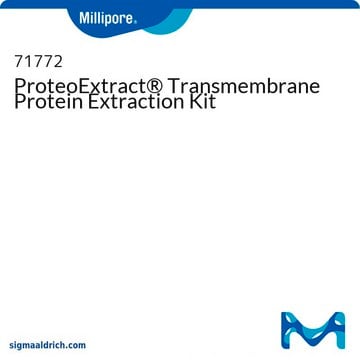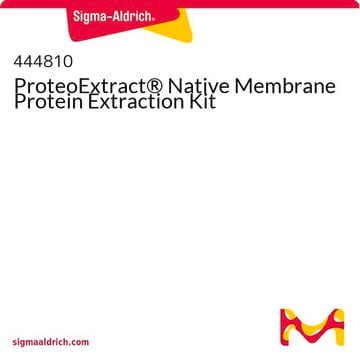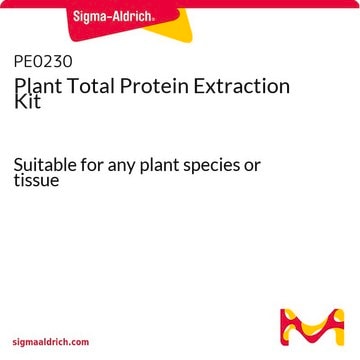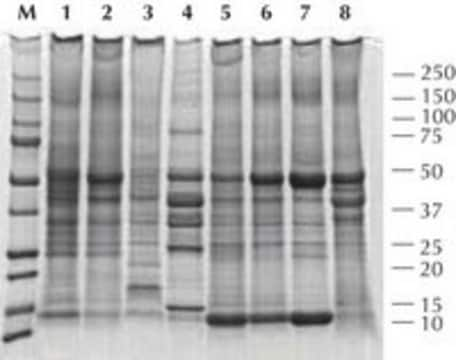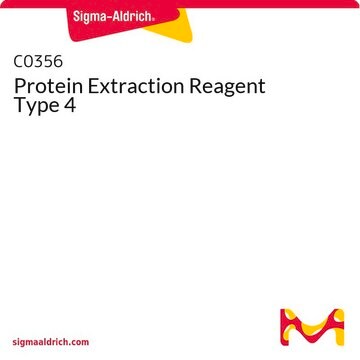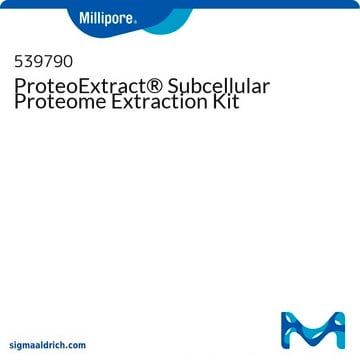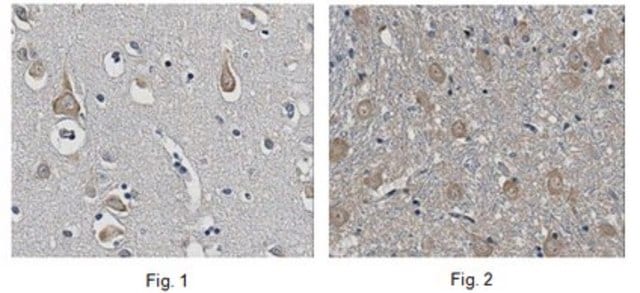CE0050
CelLytic™ MEM Protein Extraction Kit
Szinonimák:
Membrane protein extraction kit
Bejelentkezésa Szervezeti és Szerződéses árazás megtekintéséhez
Összes fotó(1)
About This Item
UNSPSC kód:
41116134
NACRES:
NA.56
Javasolt termékek
technika/technikák
protein extraction: suitable
Minőségi szint
kiszállítva
wet ice
tárolási hőmérséklet
−20°C
Általános leírás
CelLytic™ MEM Protein Extraction Kit offers a fast and convenient method to isolate hydrophobic and raft microdomain associated proteins from cells. The method is based on phase separation and does not require cell membrane isolation. The separated proteins can be used for further experiments such as SDS-PAGE, Western blotting, dot blotting, and immunoprecipitation. The kit has been tested on, but not limited to, HeLa, HEK-293, NIH 3T3, COS and CHO cell lines.
Membrane proteins make up around 20-30% of an organism′s genome and serve as cellular gatekeepers, regulators, and sensors. They have diverse cellular functions, such as shielding the cell from external toxins, being the starting point of intracellular signaling cascades, and retaining critical ion concentrations.
Alkalmazás
CelLytic™ MEM Protein Extraction Kit has been used for de novo lipogenesis measurements using hepatocytes and to extract membrane proteins for western blotting.
Alkalmasság
Sufficient reagents supplied for 80 tests.
Jogi információk
CelLytic is a trademark of Sigma-Aldrich Co. LLC
Kit Components Only
Product No.
Leírás
- Lysis and Separation Buffer 50 mL
- Wash Buffer for CelLytic MEM 50 mL
- Sodium Chloride, 4M Solution 1.5 mL
Kit Components Also Available Separately
Product No.
Leírás
Biztonsági adatlap
- P8340Protease Inhibitor Cocktail, for use with mammalian cell and tissue extracts, DMSO solution 1 mLBiztonsági adatlap
Figyelmeztetés
Warning
Figyelmeztető mondatok
Óvintézkedésre vonatkozó mondatok
Veszélyességi osztályok
Eye Irrit. 2 - Skin Irrit. 2
Tárolási osztály kódja
10 - Combustible liquids
Lobbanási pont (F)
188.6 °F - closed cup
Lobbanási pont (C)
87 °C - closed cup
Analitikai tanúsítványok (COA)
Analitikai tanúsítványok (COA) keresése a termék sarzs-/tételszámának megadásával. A sarzs- és tételszámok a termék címkéjén találhatók, a „Lot” vagy „Batch” szavak után.
Már rendelkezik ezzel a termékkel?
Az Ön által nemrégiben megvásárolt termékekre vonatkozó dokumentumokat a Dokumentumtárban találja.
Az ügyfelek ezeket is megtekintették
Yue Zhao et al.
Cancer medicine, 7(8), 3977-3987 (2018-07-06)
Esophageal squamous cell carcinoma (ESCC) is a malignant disease with poor prognosis. Because of early metastasis prior to diagnosis and therapeutic resistance, ESCC has become one of the leading causes of cancer-related death. Here, we investigated the clinicopathological significance of
Jun Yang et al.
Bioscience, biotechnology, and biochemistry, 83(6), 1117-1123 (2019-03-08)
It has been reported that lncRNA POU3F3 was upregulated in esophageal squamous-cell carcinomas, indicating its role as an oncogene in this disease. However, the mechanism of its function and its involvement in other malignancies is unknown. In the present study
Hiroaki Tateno et al.
Glycobiology, 26(12), 1328-1337 (2016-04-03)
Human somatic stem cells such as human mesenchymal stem cells (hMSCs) are considered attractive cell sources for stem cell-based therapy. However, quality control issues have been raised concerning their safety and efficacy. Here we used lectin microarray technology to identify
Tomoaki Furuta et al.
Cancer science, 112(9), 3722-3731 (2021-06-12)
The rBC2LCN lectin, known as a stem cell marker probe that binds to an H type 3 fucosylated trisaccharide motif, was recently revealed to also bind to pancreatic ductal adenocarcinoma (PDAC) cells. A lectin-drug conjugate was generated by fusing rBC2LCN
Willy Morelle et al.
The Journal of clinical endocrinology and metabolism, 102(4), 1375-1386 (2017-03-23)
TMEM165 deficiency is a severe multisystem disease that manifests with metabolic, endocrine, and skeletal involvement. It leads to one type of congenital disorders of glycosylation (CDG), a rapidly growing group of inherited diseases in which the glycosylation process is altered.
Tudóscsoportunk valamennyi kutatási területen rendelkezik tapasztalattal, beleértve az élettudományt, az anyagtudományt, a kémiai szintézist, a kromatográfiát, az analitikát és még sok más területet.
Lépjen kapcsolatba a szaktanácsadással

